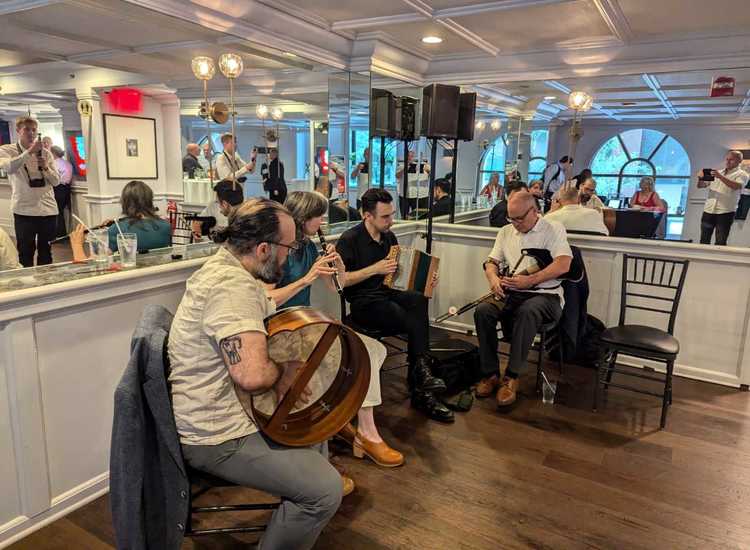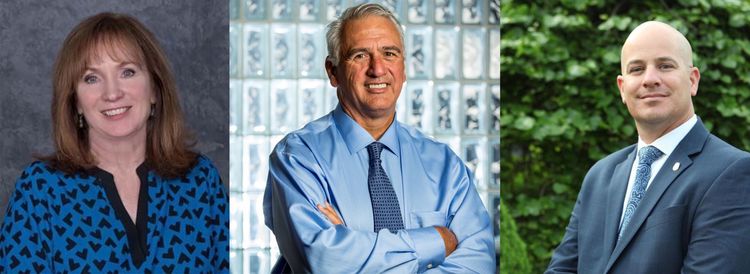By Larry Kirwan
[caption id="attachment_88813" align="alignright" width="300"] Dr. Noel Browne. RTE Archives photo.
On April 11th, 1951, Dr. Noel Browne, Ireland’s Minister for Health, resigned from the first coalition government, and a new Ireland was born.
His decision had far reaching consequences.
The most important was that church and state would begin to separate and the nascent Republic of Ireland would set out on a long painful journey that would eventually lead to an independent civil society.
Within weeks the coalition government fell and in the subsequent election Éamon de Valera and his Fianna Fáil party were returned to power.
Sean MacBride’s Clann na Poblachta party was decimated, and Archbishop John Charles McQuaid, de facto leader of the Irish Catholic Church, would soon be seen in a new light.
Hopefully, you can find out how this all came to pass at The Irish Repertory Theatre when my play, “Rebel in the Soul,” opens for previews tonight.
[caption id="attachment_88815" align="alignright" width="300"] Archbishop John Charles McQuaid.
The story has always fascinated me, probably because the three main characters, Browne, MacBride, and McQuaid, were such interesting figures.
It’s hardly surprising that each gave a somewhat different account of how the events in question came to pass.
It’s been a thrill to watch Patrick Fitzgerald, Sean Gormley, and John Keating bring these characters back to life.
In many ways we see the events unfold through the eyes of Browne’s wife, Phyllis, played by Sarah Street.
Mrs. Browne was a singular person herself for she knowingly married a man with tuberculosis. Talk about love and commitment!
I hasten to add that this is a play, not a documentary.
Playwrights can go places that the narrators of mere facts cannot.
We can explore character and act on strong supposition, or even mere hunches.
And what characters!
You couldn’t invent Browne’s life and trajectory.
His parents both died of tuberculosis, the dreaded “silent death,” leaving him orphaned and penniless on the streets of London at the age of ten.
From out of the blue he was granted a full scholarship to a prestigious Catholic Prep school and eventually returned to Ireland as a member of a wealthy Anglo-Irish family.
He became a medical doctor with the one goal of eradicating tuberculosis. He was elected to parliament and on his first day he was made Minister for Health.
[caption id="attachment_88814" align="alignright" width="225"] Dr. Sean MacBride. Dutch National Archives photo.
Sean MacBride was the son of Maude Gonne - muse of Yeats - and Captain John MacBride - 1916 martyr.
At his birth, his mother declared him “a man of destiny.”
And he surely was.
A confidant of Michael Collins in his mid-teens, MacBride became IRA Chief of Staff, founded Clann na Poblachta - arguably the most promising Irish political party - and after his political career imploded he helped found Amnesty International and gave his name to the MacBride Principles that did so much to outlaw sectarianism in Northern Ireland.
And what of John Charles?
So powerful and ubiquitous was he in Irish life that he had little need of a surname or title.
Nowadays it’s often hard to appreciate the power of the Catholic Church in Ireland up until the 1970s or just how completely this complicated man micro-managed the country’s political, social, and cultural affairs.
Volumes have been written about Archbishop McQuaid and, yet, he usually emerges as an ecclesiastical ogre, instead of a solitary man of his times and position.
An obsessive-compulsive, he had a deep love of poetry and, indeed, was an unlikely patron of the hard-drinking, obstreperous poet, Patrick Kavanagh.
Did anyone ever know Sean MacBride?
Such an extraordinary and admirable man, and an Irish-American icon, he was not at his best during the 1951 crisis.
Then again, which of us is in the eternal battle between principle and pragmatism.
There’s a haunted quality to MacBride’s gaze that’s hard to ignore in most portraits.
And Browne?
He eradicated the scourge of tuberculosis from Ireland and demanded free comprehensive health coverage for pregnant women and children up to the age of 16.
But was ever a man so unsuited to the game of politics.
The U.S. is still wrestling with the issue of decent health care for all its citizens.
Perhaps, we’re in need of an iconoclastic Noel Browne, a man who was willing to risk all for his goals back in 1951.
- “Rebel in the Soul,” written by Larry Kirwan, directed by Charlotte Moore, at The Irish Repertory Theatre, 132 W. 22nd St., Manhattan, April 12-May 21. More at irishrep.org or (212)727-2737.









